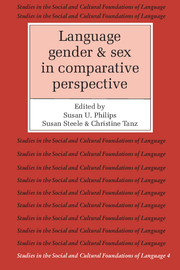Book contents
- Frontmatter
- Contents
- Acknowledgments
- List of contributors
- Introduction: The interaction of social and biological processes in women's and men's speech
- Part I Women's and men's speech in cross-cultural perspective
- Part II Gender differences in the language of children
- Introduction
- 6 Preschool boys' and girls' language use in pretend play
- 7 Sex differences in parent–child interaction
- 8 Children's arguing
- 9 Do different worlds mean different words?: an example from Papua New Guinea
- Part III Sex differences in language and the brain
- References
- Index
Introduction
Published online by Cambridge University Press: 05 June 2012
- Frontmatter
- Contents
- Acknowledgments
- List of contributors
- Introduction: The interaction of social and biological processes in women's and men's speech
- Part I Women's and men's speech in cross-cultural perspective
- Part II Gender differences in the language of children
- Introduction
- 6 Preschool boys' and girls' language use in pretend play
- 7 Sex differences in parent–child interaction
- 8 Children's arguing
- 9 Do different worlds mean different words?: an example from Papua New Guinea
- Part III Sex differences in language and the brain
- References
- Index
Summary
The question of whether gender differences exist in the language of children has been a subject of investigation for many years. A review by Harris (1977) cites empirical research dating back to 1913. McCarthy published her much cited summary of then-existing research in 1954. An enormous variety of language phenomena have been investigated with respect to this question: clarity of articulation, age at first word, voice pitch, grasp of various syntactic constructions, rate of vocabulary growth, incidence of stuttering, skill in making verbal analogies, simple loquacity, and so forth. (See Maccoby and Jacklin, 1974.) But there has been little conceptual unity in this work, partly because until the 1960s no attempt was made to develop an overall theoretical perspective about what children learn when they learn language. In fact, it is difficult to draw conclusions from the research done to date. Recent reviews of the field have come to opposite conclusions. Maccoby and Jacklin (1974) in their extensive survey state that “female superiority on verbal tasks has been one of the more solidly established generalizations in the field of sex differences and recent research continues to support the generalization to a degree.” Harris (1977) agrees with this assessment. On the other hand, Fairweather (1976) and Maccauley (1978) disagree, the title of the latter's review stating his position: “The Myth of Female Superiority in Language.”
- Type
- Chapter
- Information
- Language, Gender, and Sex in Comparative Perspective , pp. 163 - 177Publisher: Cambridge University PressPrint publication year: 1987
- 4
- Cited by



